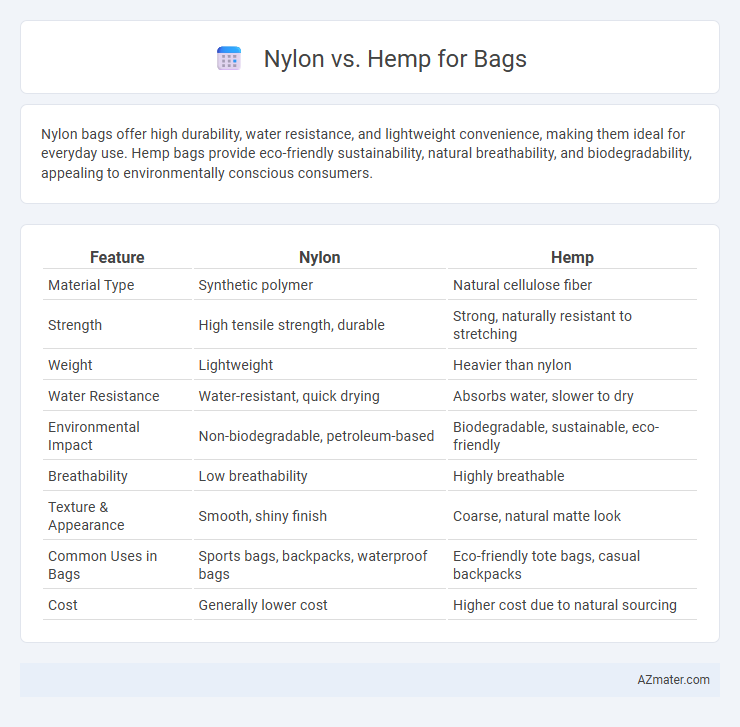Nylon bags offer high durability, water resistance, and lightweight convenience, making them ideal for everyday use. Hemp bags provide eco-friendly sustainability, natural breathability, and biodegradability, appealing to environmentally conscious consumers.
Table of Comparison
| Feature | Nylon | Hemp |
|---|---|---|
| Material Type | Synthetic polymer | Natural cellulose fiber |
| Strength | High tensile strength, durable | Strong, naturally resistant to stretching |
| Weight | Lightweight | Heavier than nylon |
| Water Resistance | Water-resistant, quick drying | Absorbs water, slower to dry |
| Environmental Impact | Non-biodegradable, petroleum-based | Biodegradable, sustainable, eco-friendly |
| Breathability | Low breathability | Highly breathable |
| Texture & Appearance | Smooth, shiny finish | Coarse, natural matte look |
| Common Uses in Bags | Sports bags, backpacks, waterproof bags | Eco-friendly tote bags, casual backpacks |
| Cost | Generally lower cost | Higher cost due to natural sourcing |
Introduction: Nylon vs Hemp for Bags
Nylon and hemp are two popular materials used in bag manufacturing, each offering distinct advantages in durability and sustainability. Nylon is known for its lightweight, water-resistant properties and high tensile strength, making it ideal for everyday use and outdoor activities. Hemp, a natural fiber, provides exceptional eco-friendliness, biodegradability, and breathability, appealing to environmentally conscious consumers.
Material Origins and Sustainability
Nylon, derived from petrochemicals, relies on non-renewable fossil fuels, contributing to environmental pollution and high energy consumption during production. Hemp, a natural fiber obtained from the Cannabis sativa plant, is biodegradable, requires minimal pesticides, and supports soil health, making it a highly sustainable alternative. Choosing hemp over nylon for bags significantly reduces carbon footprint and promotes eco-friendly manufacturing practices.
Durability and Strength Comparison
Nylon bags exhibit superior durability and tensile strength due to their synthetic polymer composition, making them highly resistant to abrasion, water, and UV damage. Hemp bags offer remarkable natural strength and biodegradability, with fibers that are strong but generally less resistant to prolonged moisture exposure and wear compared to nylon. The choice between nylon and hemp depends on the need for synthetic resilience or eco-friendly robustness in bag construction.
Water Resistance and Weather Adaptability
Nylon bags offer superior water resistance due to their synthetic fibers and tight weave, effectively repelling moisture and protecting contents during heavy rain. Hemp bags, while naturally durable and breathable, absorb water more readily, making them less suitable for wet conditions without additional waterproof treatments. Weather adaptability favors nylon in extreme wet or humid environments, whereas hemp performs better in dry, temperate climates with improved breathability and biodegradability.
Weight and Portability Differences
Nylon bags are significantly lighter, often weighing between 100 to 200 grams, making them highly portable and ideal for everyday carry and travel. Hemp bags tend to be heavier, typically ranging from 300 to 500 grams due to the dense natural fibers, which can reduce portability but increase durability and eco-friendliness. The lightweight nature of nylon enhances ease of transport, while hemp offers a robust alternative with a slightly increased weight.
Environmental Impact and Biodegradability
Hemp bags offer a significantly lower environmental impact compared to nylon, as hemp cultivation requires fewer pesticides, less water, and regenerates soil health, making it a sustainable resource. Unlike nylon, a synthetic polymer derived from petrochemicals that contributes to microplastic pollution and takes centuries to decompose, hemp fibers are biodegradable and break down naturally within months under composting conditions. Choosing hemp bags supports reduced carbon emissions and waste accumulation, aligning with eco-friendly and circular economy principles.
Style, Texture, and Aesthetics
Nylon bags offer a sleek, smooth texture with a modern, polished appearance ideal for urban and active lifestyles, characterized by vibrant colors and a lightweight feel that complements contemporary fashion. Hemp bags feature a coarse, natural texture with an earthy, rustic aesthetic that appeals to eco-conscious consumers seeking sustainable and durable materials with a timeless, handcrafted look. Both materials provide unique style and durability, with nylon excelling in versatility and water resistance, while hemp emphasizes organic appeal and environmental sustainability.
Cost Analysis: Nylon vs Hemp Bags
Nylon bags typically cost less upfront due to cheaper synthetic production and mass manufacturing, making them more affordable for budget-conscious consumers. Hemp bags, while having a higher initial price, offer long-term value with durability and biodegradability, reducing environmental costs and potential replacement expenses. Considering lifecycle expenses, hemp bags present a sustainable investment compared to the frequent replacement cycles associated with nylon bags.
Maintenance and Cleaning Requirements
Nylon bags require minimal maintenance, as they are water-resistant and can be easily wiped clean with a damp cloth or mild soap solution, making them ideal for everyday use. Hemp bags need more careful handling to preserve their natural fibers, often requiring gentle hand washing with mild detergent and air drying to prevent shrinkage or damage. Both materials benefit from regular cleaning, but nylon's durability offers a more convenient, low-maintenance option compared to the eco-friendly yet delicate hemp fabric.
Final Verdict: Choosing the Best Material
Hemp bags offer superior environmental benefits due to their biodegradability and low water usage in cultivation, making them an eco-friendly choice compared to synthetic nylon. Nylon bags provide greater durability, water resistance, and a lighter weight, ideal for heavy-duty and weather-resistant needs. The final decision depends on prioritizing sustainability goals with hemp or durability and performance with nylon.

Infographic: Nylon vs Hemp for Bag
 azmater.com
azmater.com